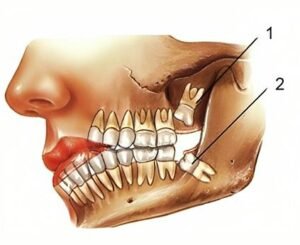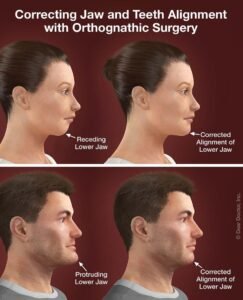
Dentistry can sometimes be confusing, especially with all the different specialisations. Many people feel unsure or anxious about what different dental specialists do. One way to make things clearer and less stressful is by explaining each specialist’s role.
While “oral” and “surgeon” seem straightforward, you might still wonder, “What exactly do oral surgeons do?
Let’s start from the basics
Who is an oral surgeon?
An oral surgeon/ maxillofacial surgeon is a dentist who has special training to do surgeries on the mouth, teeth, jaws, and face. They can help with things like removing wisdom teeth, fixing jaw problems, or treating injuries in the mouth.
Imagine this: You’re in the middle of a busy day when suddenly, a sharp, unbearable toothache hits you. After trying to ignore it for hours, you rush to your dentist, only to hear the words you were dreading: “You need to see an oral surgeon/maxillofacial surgeon.”
Your heart skips a beat, and an uneasy feeling starts creeping in. Thoughts race through your mind—Do I have something serious? Is surgery the only option? As the fear builds, your hands start trembling. It’s completely natural to feel anxious.
But here’s the good news: At our dental clinic in Manjeri , we’ve seen this scenario play out countless times. We understand your worry, and we want to assure you that it’s not as scary as it seems. Before you panic, take a deep breath and get familiar with the role of an oral surgeon. Understanding what they do can give you peace of mind.
8 Common Procedures by Oral Surgeons
Dentists often send patients to dental surgeons for complex procedures that need special skills, tools, or pain control methods. Here are a few tasks dental surgeons handle:
Remove wisdom teeth and other difficult teeth

Oral surgeons specialise in removing teeth that are hard to extract, especially wisdom teeth that are impacted or growing at an angle. These teeth can cause pain, swelling, or infection if left untreated. Oral surgeons/maxillofacial surgeon. ensure the removal is safe and efficient, often under anaesthesia for patient comfort.
2.Perform surgeries on the jaw to fix alignment issues

When the upper and lower jaws don’t meet properly, it can affect chewing, speaking, and even breathing. Oral surgeons correct these misalignments through jaw surgery (orthognathic surgery), which helps improve not only function but also facial appearance and symmetry.
3. Place dental implants for missing teeth

If you’re missing teeth, oral surgeons/maxillofacial surgeons. can place dental implants, which are titanium posts surgically inserted into the jawbone. These implants provide a strong foundation for artificial teeth. It will restore the look and function of natural teeth and improve your ability to eat and speak.
4. Treat facial injuries, like broken jaws or damaged teeth

Accidents or injuries can lead to broken jaws, damaged teeth, or facial trauma.An Oral surgeons repair these injuries, often performing delicate procedures including realign bones, reconstruct damaged tissue, and restore the natural appearance of your face.They play a vital role in emergency facial reconstruction.
5. Remove cysts, tumours, or growths in the mouth and jaw

Oral surgeons are trained to identify and remove cysts, tumours, or abnormal growths in the mouth, and jaw. These procedures help prevent the spread of infections or diseases and can involve careful reconstruction to maintain the appearance and structure of the affected area.
6. Manage severe dental pain or infections
In cases where regular dental care isn’t enough, oral surgeons treat severe tooth or jaw pain caused by infections, abscesses, or nerve issues. They often perform root surgeries or other procedures to eliminate pain and prevent further complications, ensuring long-term oral health.
7. Help with issues like sleep apnea through surgery

For patients with sleep apnea who struggle with breathing while sleeping, oral surgeons can perform surgeries to remove excess tissue, reposition the jaw, or open up the airways. This can significantly improve sleep quality and reduce the risk of other health problems caused by sleep apnea.
8. Perform reconstructive surgery after accidents or trauma

After severe accidents, oral surgeons carry out reconstructive surgeries to rebuild the mouth, jaw, or facial bones. These procedures not only restore function, such as the ability to chew or speak, but also focus on rebuilding the appearance, helping patients recover both physically and emotionally.
Educational Qualification of Oral Surgeon
Sometimes, you may wonder, What qualifications allow an oral surgeon to perform such complex tasks or procedures? Like dentists, oral surgeons begin with a bachelor’s degree in dentistry. Afterward, they undergo specialised training, which makes them experts in their field.
In order to shed more light on this, let’s look at how a dentist differs from an oral surgeon.
Difference Between Dentists & Oral Surgeon
Dentists are like your everyday family doctors for your teeth. They clean your teeth, fill cavities, and fix broken teeth. Yes, they are the general practitioners of dentistry.
Dental surgeons, on the other hand, are specialists who handle more complex problems. They extract wisdom teeth, perform surgeries on the jaw, and place dental implants. They’re the experts when things get more complicated.
In terms of education, dentists go to dental school for several years. Dental surgeons also go to dental school but undergo additional training to become specialists.
Dentists usually work in private dental clinics, while dental surgeons often work in hospitals or specialised dental clinics.
Dentists handle procedures like fillings, cleanings, and simple extractions. Dental surgeons perform more complex surgeries, such as wisdom tooth removal and jaw surgery.
When it comes to pain management, both use local anaesthesia to numb the area. However, dental surgeons can also use general anaesthesia, which puts you to sleep for more extensive procedures.
Remember: Dentists are your first stop for most dental care. If you need something more complicated, they will refer you to a dental surgeon.
For a better understanding, please refer to the table below.
| Feature | Dentist | Oral Surgeon |
| Focus | General dental care | Complex oral and maxillofacial surgery |
| Procedures | Fillings, cleanings, extractions, root canals | Wisdom tooth removal, jaw surgery, dental implants, facial trauma repair |
| Training | Dental school degree | Dental school degree + additional surgical training |
| Scope | Treats common dental problems | Handles more complex surgical cases |
| Setting | Typically private dental offices | Often in hospitals or specialized clinics |
For the Best Oral Surgeons, Visit Here:
When you visit an oral surgeon, you’re looking for someone who makes you feel comfortable and performs the procedure with the utmost care and precision. You can find such doctors at Maanu Dental Clinic. They are experienced dental practitioners with expertise in complex oral procedures. To make an appointment, call us at: